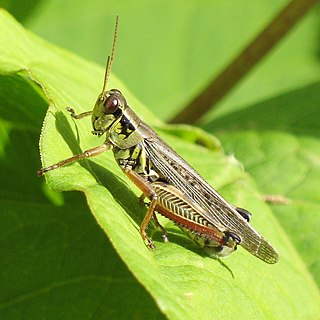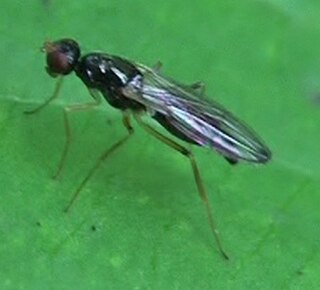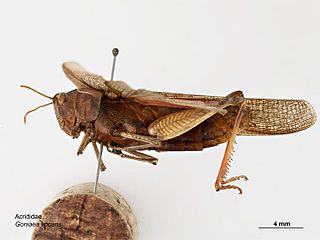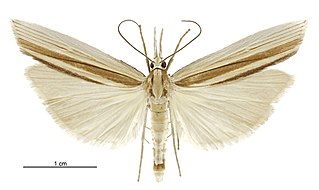
The Chinese mantis is a species of mantis native to Asia and the nearby islands. In 1896 this species was accidentally introduced by a nurseryperson at Mt. Airy near Philadelphia, United States. Tenodera sinensis often is erroneously referred to as Tenodera aridifolia sinensis because it was at first described as a subspecies of Tenodera aridifolia, but Tenodera sinensis is now established as a full species.

Melanoplus is a large genus of grasshoppers. They are the typical large grasshoppers in North America. A common name is spur-throat grasshoppers, but this more typically refers to members of the related subfamily Catantopinae.
Anaphleps is a monotypic moth genus in the subfamily Arctiinae described by Rothschild in 1916. It contains the single species Anaphleps angustipennis, which is found on Vulcan Island, Papua New Guinea.

The Strongylophthalmyiidae are a small family of about 80 species of slender, long-legged flies, the majority of which occur in the Oriental and Australasian regions. They are divided into two genera, the monotypic Southeast Asian genus Nartshukia Shatalkin, 1993 and Strongylophthalmyia Heller, 1902. The relationships of the group are obscure; formerly the genus Strongylophthalmyia was classified with the Psilidae, and some recent classifications place it within the Tanypezidae. Little is known of their biology, but many species seem to be associated with rotting bark.

Tenodera angustipennis is a species of mantis native to Asia and nearby areas of Oceania. The species was introduced and became established in the eastern United States. Tenodera angustipennis was noticed as early as 1921 in Aberdeen, Maryland, but that occurrence was not noted in a published record until 1933.
Stenopterosia is a genus of moths in the subfamily Arctiinae. It contains the single species Stenopterosia angustipennis, which is found in Vietnam.
Ocypteromima is a genus of parasitic flies in the family Tachinidae. There are about five described species in Ocypteromima.

Goniaea australasiae is a species of grasshopper in the family Acrididae.
Goniaea ensicornis is a species of grasshopper in the family Acrididae.
Goniaea opomaloides is a species of grasshopper in the family Acrididae. It was described by Francis Walker in 1870.

Goniaea vocans is a species of grasshopper in the family Acrididae.

Goniaea is a genus of grasshoppers in the tribe Catantopini from Australia.
Goniaea carinata is a species of grasshopper in the family Acrididae.

Goniaea furcifera is a species of grasshopper in the family Acrididae. It was described by Francis Walker in 1870.
Pardillana exempta is a species of grasshopper in the genus Pardillana of the family Acrididae. It was described by Francis Walker in 1870.

Orocrambus angustipennis is a species of moth in the Crambinae family. It is endemic to New Zealand. O. angustipennis is present in the North Island, South Island and the Chatham Islands.
Trigonometopus is a genus of flies in the family Lauxaniidae. There are more than 20 described species in Trigonometopus.
Triploechus is a genus of bee flies, insects in the family Bombyliidae. There are about 10 described species in Triploechus.
Tachytrechus angustipennis is a species of long-legged fly in the family Dolichopodidae.

Diogmites angustipennis, the prairie robber fly, is a species of robber flies in the family Asilidae.










